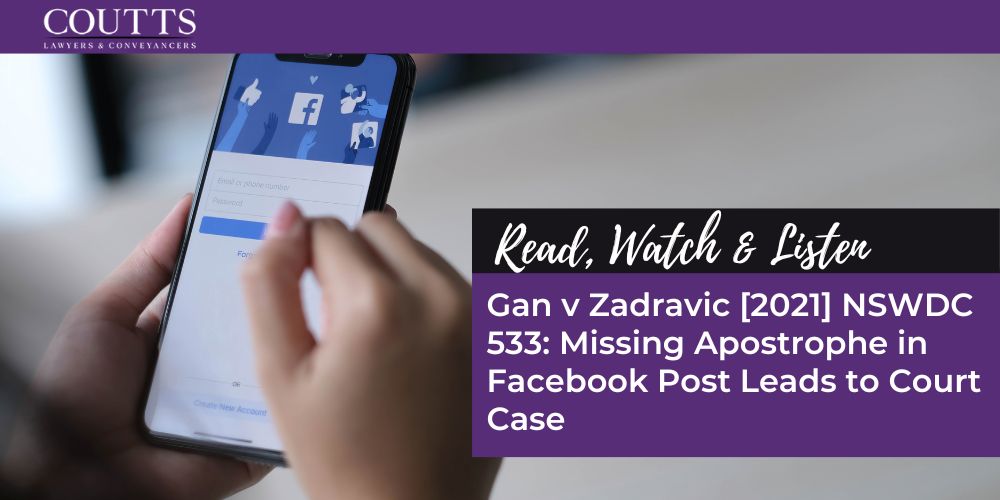KEY TAKE-OUT:
A recent ruling out of the District Court of New South Wales highlights the importance of caution when posting on social media as a missing apostrophe has led to a defamation claim which could cost the defendant thousands of dollars.
On 22 October 2020, Mr Zadravic, the defendant, made a Facebook post which stated his former boss, the plaintiff, was “selling multi mullion $ (sic) homes in Pearl Beach but can’t pay his employees superannuation”. The Facebook post included the plaintiff’s full name and was posted on the defendant’s personal Facebook account. The defendant deleted the post within 12 hours of publishing, but not before the plaintiff saw the post. Due to the wording of the Facebook post, the plaintiff brought a defamation claim against the defendant.
In case you missed it, the defendant wrote “employees” instead of “employee’s”. By consequence of the missing apostrophe, and content of the Facebook post, the plaintiff pleaded the following imputations were created by publishing the post:
- That the plaintiff takes advantage of his employees by not paying their superannuation entitlements.
- That the plaintiff is deceitful by misappropriating funds.
- That the plaintiff is not a good employer to work for in that he has a disregard for his employees.
The plaintiff relied upon the grapevine effect, that is, that the defamatory material will be further disseminated and spread to other persons, rather than confined to those to whom the matter is immediately published. The defendant, however, submitted failure to punctuate the social media post was a mistake and merely trivial and sought to have the plaintiff’s claim struck out. Both parties provided written statements to the court, and the plaintiff provided a letter from the company accountant verifying that the defendant’s superannuation had been paid.
In her judgement, DCJ Gibson highlighted the seriousness of the claims in the Facebook post, particularly that a failure to pay employee superannuation contributions may amount to a criminal offence. Her Honour found the alleged imputations, as referred to above, reasonably capable of being conveyed and acknowledged that the Facebook post was read and understood by several persons.
Her Honour said: “The nature of social media is such that, given the continuous feed of posts scrolling through accounts, the first twelve hours or so are the most potent, in terms of the nature and extent of harm.”
Her Honour also said: “The difficulty for the plaintiff is the use of the word ’employees’ in the plural. This suggests a systemic pattern of conduct. To fail to pay one employee’s superannuation entitlement might be seen as unfortunate; to fail to pay some or all of them looks deliberate”.
Her Honour dismissed the defendant’s application to dismiss the claim and the defendant was ordered to pay the plaintiff’s costs. The matter will be returning to court within the next few weeks to determine how the case will proceed.
The rise of technological advancement over the past decade has brought exponential growth in digital defamation cases. As in this case, the grapevine effect is increasingly used in digital defamation cases due to the nature of social media platforms.
Our Top Tips
- Check out our other blog posts on this area of law: ‘When Words Hurt – Can I Sue for Defamation?’ and ‘When Your Comments Online Can Cost You’ so that you are aware of risks that can arise when using social media.
- Think twice before posting about personal matters involving others on social media sites
- Proofread and punctuate
Defamation is a complex area of law. If you think you have a claim in defamation, or want to defend a claim, it is important to seek independent legal advice relevant to your facts and circumstances. At Coutts, we have lawyers experienced in personal injury matters that can assist you.
For further information please don’t hesitate to Contact Coutts today.
This blog is merely general and non-specific information on the subject matter and is not and should not be considered or relied on as legal advice. Coutts is not responsible for any cost, expense, loss or liability whatsoever to this blog, including all or any reliance on this blog or use or application of this blog by you.



